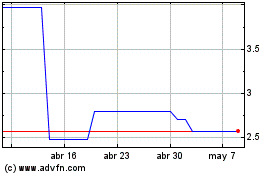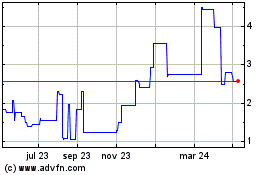Beyond Ethereum: Getting Started With Cross-Chain Trading
02 Noviembre 2021 - 11:54AM
NEWSBTC
Despite its prominence as the most well-established smart contract
platform and decentralized finance (DeFi) ecosystem, Ethereum is
gradually seeing an exodus of users to other platforms — largely
due to its often gut-wrenchingly high transaction fees and
congestion. This is particularly the case among
cryptocurrency traders, who are moving away from Ethereum en-masse
to platforms like Avalanche and Binance Smart Chain. This is owed
to their dramatically lower fees and improved speed over Ethereum,
as well as the rapid development of their token ecosystems — and
the opportunities this brings. Decentralized exchanges (DEXs)
have emerged as the simplest way to gain exposure to these new
ecosystems, allowing traders to access the most promising tokens at
an early stage without waiting for centralized exchange
listings. Here, we take a look at three of the most promising
cross-chain ecosystems, and the DEXs that act as their primary
entry points. Avalanche: Pangolin In development since
mid-2020, Avalanche is one of the most well-known Ethereum
competitors and has grown into a thriving ecosystem of powerful
DApps and projects. Today, the Avalanche landscape is filled
with a wide variety of popular platforms, ranging from DeFi tools
to play-to-earn games, NFT marketplaces, and more. Pangolin
currently sits at the very center of this rapidly blossoming
ecosystem. As a decentralized exchange platform Pangolin provides a
permissionless, trustless way to exchange Avalanche (AVAX) coins
and a massive variety of Avalanche-based tokens while keeping fees
down to a minimum. With Pangolin, trades are completed in
just seconds, making it perfectly suited to professional and
high-frequency traders. It’s also simple to use, ensuring even
inexperienced traders can use it without any hurdles.
https://twitter.com/pangolindex/status/1454094600696516614 Since
Pangolin is an automated market maker, users are free to allocate
their tokens as liquidity to the protocol and earn a passive yield
as a liquidity provider. But more than this, it also includes
a variety of additional tools that make it the ideal entry route
into the Avalanche landscape. This includes a wide range of yield
farms, which users can use to earn boost the yield they earn on
their liquidity provider (LP) tokens, as well as Wyre integration —
allowing users to purchase AVAX using their debit or credit
card. As Avalanche’s most popular DeFi app and arguably its
most powerful DEX, Pangolin is an essential component of any
Avalanche user’s toolkit. Velas: WagyuSwap Billed as the
first AI-powered blockchain, Velas leverages a unique solution
known as “artificial intuition” to rapidly and automatically adjust
its operating parameters based on network conditions to maximize
performance. As a fork of Solana, Velas inherits all of its
capabilities, including massive scalability, extreme security, and
industry-leading throughput (with support for up to 75,000
transactions per second). But more than this, it also supports the
Ethereum Virtual Machine, providing a simple development
environment. WagyuSwap is the first DEX on Velas Chain and
the primary source of liquidity for Velas-based tokens. As an AMM,
it features permissionless liquidity provision, limitless
liquidity, and algorithmic asset pricing.
https://twitter.com/WagyuSwap_app/status/1435610670297387009 It’s
designed to act as a hub for users and developers operating on
Velas. It’s building the tools and services necessary to bootstrap
the Velas ecosystem and bring it up to par with competing
blockchains. In line with this, WagyuSwap will also include
its own staking solution, a variety of yield farms, and a
decentralized lottery feature. In time, WagyuSwap hopes to become
the cornerstone of DeFi on Velas and plans to expand its services
in line with market demand. If you’re looking to dive into a
new ecosystem right at its very inception, then Velas is certainly
worth exploring. Binance Smart Chain: PancakeSwap Right
now, Binance Smart Chain is undeniably Ethereum’s biggest
competitor. In terms of sheer size and development, Binance Smart
Chain is second only to Ethereum — having a complete ecosystem of
DApps and DeFi tools. The platform is essentially a faster,
cheaper version of Ethereum. It achieves this by leveraging a
highly efficient consensus system known as Proof of Staked
Authority (PoSA) in addition to a faster block time to dramatically
increase throughput and keep fees down to a minimum. As with
most DeFi-capable blockchains, a DEX lies at the heart of DeFi on
Binance Smart Chain. In this case, PancakeSwap is not only by far
the most popular DEX on BSC, but also its most popular DApp in
general.
https://twitter.com/pancakeswap/status/1443493779084759040 Like the
other options in this list, PancakeSwap falls under the AMM class
of DEXs and has its own permissionless liquidity pools for a huge
range of BEP-20 assets. More than this, it also features a huge
number of yield farms, prediction markets, a lottery tool, an NFT
marketplace, and its own NFT collections. The platform is governed
by holders of its native utility and governance token, known as
$CAKE. PancakeSwap is an entire ecosystem unto itself and is
one of the most frequently updated DApps on BSC — with new features
and improvements being added regularly. If you’re looking to get
started with BSC, PancakeSwap is almost certain to be your first
port of call.
PancakeSwap Token (COIN:CAKEUSD)
Gráfica de Acción Histórica
De Nov 2024 a Dic 2024

PancakeSwap Token (COIN:CAKEUSD)
Gráfica de Acción Histórica
De Dic 2023 a Dic 2024
